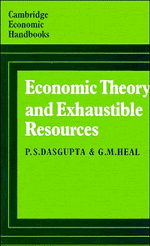Book contents
- Frontmatter
- PREFACE
- Contents
- Chapter 1 A PREVIEW
- Chapter 2 RESOURCE ALLOCATION IN A TIMELESS WORLD
- Chapter 3 EXTERNALITIES
- Chapter 4 INTERTEMPORAL EQUILIBRIUM
- Chapter 5 RENEWABLE RESOURCES: SOME ECOLOGICAL AND ENVIRONMENTAL MODELS
- Chapter 6 EXHAUSTIBLE RESOURCES: AN INTRODUCTION
- Chapter 7 PRODUCTION WITH EXHAUSTIBLE RESOURCES
- Chapter 8 RESOURCE DEPLETION AND CAPITAL ACCUMULATION IN A COMPETITIVE ECONOMY
- Chapter 9 MEASURABILITY, COMPARABILITY AND THE AGGREGATION OF INTERGENERATIONAL WELFARES
- Chapter 10 THE OPTIMAL DEPLETION OF EXHAUSTIBLE RESOURCES
- Chapter 11 IMPERFECT COMPETITION AND EXHAUSTIBLE RESOURCES
- Chapter 12 TAXATION OF EXHAUSTIBLE RESOURCES
- Chapter 13 UNCERTAINTY, INFORMATION AND THE ALLOCATION OF RISK
- Chapter 14 UNCERTAINTY AND THE ALLOCATION OF RESOURCES
- Chapter 15 PRICE MOVEMENTS IN RESOURCE MARKETS
- Chapter 16 CONCLUSIONS
- BIBLIOGRAPHY
- INDEX
Chapter 11 - IMPERFECT COMPETITION AND EXHAUSTIBLE RESOURCES
Published online by Cambridge University Press: 04 April 2011
- Frontmatter
- PREFACE
- Contents
- Chapter 1 A PREVIEW
- Chapter 2 RESOURCE ALLOCATION IN A TIMELESS WORLD
- Chapter 3 EXTERNALITIES
- Chapter 4 INTERTEMPORAL EQUILIBRIUM
- Chapter 5 RENEWABLE RESOURCES: SOME ECOLOGICAL AND ENVIRONMENTAL MODELS
- Chapter 6 EXHAUSTIBLE RESOURCES: AN INTRODUCTION
- Chapter 7 PRODUCTION WITH EXHAUSTIBLE RESOURCES
- Chapter 8 RESOURCE DEPLETION AND CAPITAL ACCUMULATION IN A COMPETITIVE ECONOMY
- Chapter 9 MEASURABILITY, COMPARABILITY AND THE AGGREGATION OF INTERGENERATIONAL WELFARES
- Chapter 10 THE OPTIMAL DEPLETION OF EXHAUSTIBLE RESOURCES
- Chapter 11 IMPERFECT COMPETITION AND EXHAUSTIBLE RESOURCES
- Chapter 12 TAXATION OF EXHAUSTIBLE RESOURCES
- Chapter 13 UNCERTAINTY, INFORMATION AND THE ALLOCATION OF RISK
- Chapter 14 UNCERTAINTY AND THE ALLOCATION OF RESOURCES
- Chapter 15 PRICE MOVEMENTS IN RESOURCE MARKETS
- Chapter 16 CONCLUSIONS
- BIBLIOGRAPHY
- INDEX
Summary
Introduction
In earlier chapters we have discussed, among other matters, the behaviour of perfect resource markets. In fact, of course, many of these markets are substantially imperfect. In this chapter, therefore, we shall analyse the consequences of some of these imperfections. But before doing this it will be useful to make precise the sense in which the issues to be dealt with here differ from those in Chapters 3 and 5. There the focus of attention was the implication of the non-existence of certain markets. Here, matters will be different. We shall take it, in what follows, that all relevant markets exist; but that for various reasons they function wrongly. In short, we shall be concerned here with what is traditionally called imperfect competition.
Even in a timeless setting imperfect competition is difficult to model, with no widely accepted framework for the analysis. The difficulties, if anything, are compounded when one moves to an intertemporal setting that is essential for an analysis of resource depletion problems. We shall begin with the case that is the least controversial: the case of a single owner of a resource. This will lead the way for an exploration of the theory of dynamic oligopoly.
Monopoly: The Basic Issues
Consider the case of a monopolist with a stock, S0, of a resource, facing a downward sloping market demand function, p(Rt, t) where p is the price at which the flow Rt, is sold at time t.
- Type
- Chapter
- Information
- Economic Theory and Exhaustible Resources , pp. 323 - 360Publisher: Cambridge University PressPrint publication year: 1980
- 11
- Cited by



